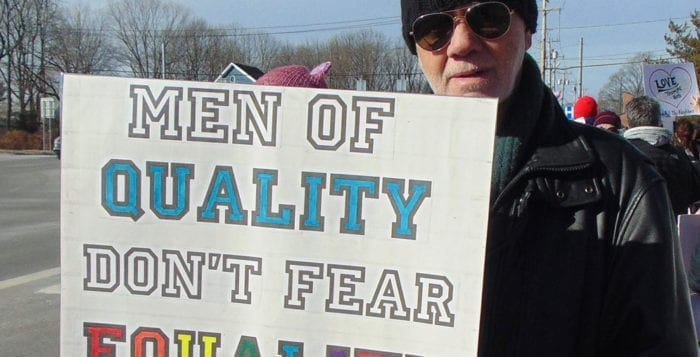Moving #MeToo momentum forward
While pregnant and riding the subway in New York City, attorney Marjorie Mesidor was grabbed from behind. Despite describing herself as typically abrasive, or as she put it, “the literal bull in the china shop,” in that moment, she froze.
“I became so fearful and so frozen because I wanted to protect my child,” Mesidor said, noting that it was also around the time frequent slashings were being reported in Manhattan. “I’ve thought about that instance more during these #MeToo discussions, and it’s given me a taste of what it feels like to be caught off guard in a moment, and your immediate reaction means everything.”
“There are so many moves made without permission, and it puts us in murky waters and we continue to extend and extend consent.”
— Marjorie Mesidor
The fear that Mesidor — a partner at Phillips & Associates, a law firm that specializes in workplace sexual harassment cases — described is unfortunately common. Women across the world show up for work or ride public transportation or otherwise exist in public knowing their own #MeToo story could unfold at any moment. But like many moved by the worldwide shift in perception created by the movement, the promotion of self-reflection and empowerment in the hopes of amending the culture of objectification is fully underway in the eyes of Mesidor and many other women, especially those elected to serve by the public.
Government officials have shared personal encounters that at times resulted in little to no justice. While noting women’s rights have come a long way in the last century, the women echoed the need for long-term remedies to truly change the culture.
“We are evolving as a society, but it’s going to take leaders to make sure that the attitudes are changing to where they need to be,” said Suffolk County Legislator Sarah Anker (D-Mount Sinai), who noted the importance of educating the next generation of boys and girls about proper conduct around the opposite sex. “We need to make sure people are held accountable for their actions and behavior, and label what is wrong and what is right — we need educational components available for school districts.”
County Legislator Kara Hahn (D-Setauket) said she is hoping from the movement to see observers of inappropriate sexual conduct empowered to speak out when they see someone being victimized, eliminating the acceptance of things like “locker room talk.” Hahn shared an emotional memory, recalling when a boy grabbed her breasts when she was in fifth grade. She said other students witnessed the incident, but she decided not to speak to a parent or teacher.
Brookhaven Town Councilwoman Valerie Cartright (D-Port Jefferson Station) pointed out a bigger problem with Hahn’s story, which included admitting the boy talked about her breasts for months after the incident.

“She may not say anything, but everyone else around her is watching and not saying anything,” Cartright said. “And then she goes home and says to herself, ‘Well, I guess I’m supposed to let that happen, because everyone else says it happened and no one said anything.’ Are we doing what we need to do to make sure women feel there’s a continued safe space? Because retaliation is very real.”
Mesidor said she thinks a culture fitted around the idea of “going with the flow” when it comes to sexual encounters has contributed to the toxicity.
“When we soften it up and we make it flowery and pretty, we raise boys who don’t know how to recognize consent, who do not ask before leaning in for a kiss,” she said. “There are so many moves made without permission, and it puts us in murky waters and we continue to extend and extend consent. Girls are brought up thinking you should be flirty instead of frigid, not requiring permission for someone to touch or interact with your body. I’m not promoting extremism, that’s certainly not what I’m saying, but we need to recognize the totality of the issue, not only with our laws but with the way we raise our children and what we deem acceptable.”
County Legislator Leslie Kennedy (R-Nesconset) advocated for teaching self-esteem, especially to young girls. She said being brought up to stick up for herself worked to her benefit when handling her own incidents of sexual harassment. Kennedy said she was in third grade the first time she was forced to experience inappropriate sexual behavior. While riding her bike in Commack, a man wearing an overcoat in the middle of the summer disrobed to unveil his naked body to her. Kennedy said she raced home to tell her mother, who called the police. Then, years later, while working at a supermarket at age 17, the owner grabbed her breasts.
“We need to make sure people are held accountable for their actions and behavior, and label what is wrong and what is right.”
— Sarah Anker
“Even though I’d lose the perfect hours to help me work around school and sports, I called the guy a pervert and I left,” she said. “We need to teach self-esteem. I think it’s because of my personality, or maybe because I went to Catholic school, we were taught everyone’s body is a temple. By not sticking up for yourself, or by posting promiscuous pictures, you’re saying, ‘Please disrespect me.’”
While some may not want to rock the boat or come off as overly sensitive, Mesidor said women need to look within to help progress the cultural shift currently underway, working as allies for other women.
“Everyone should be self-reflecting and ask themselves, ‘How am I potentially contributing to these types of cultures? What am I seeing that I may not be speaking out on? What am I experiencing that I may not be responding to?’” she said. “And we can’t be letting a man think it’s OK to say something offensive to the next person.”
Kennedy is a proponent of making men aware of the things they say, even if a supposed “joke” might be funny to a woman.
“We should be making teachable moments,” she said. “If you find the joke funny, you laugh, but then you make a comment saying many other women would not find that funny.”
Huntington Town Councilwoman Joan Cergol (D) recalled stories her mother told about her days as a stewardess, hearing how she needed to maintain a certain weight to be able to fly, have her legs checked for stubble and nose for powder, and docks to her pay for failures to comply. A common practice associated with bartenders and waitresses, they also were discouraged to wear wedding rings, ensuring to keep alive an air of availability for male customers.
“It all starts with stories — our own personal stories we can look at and say, ‘Yes, that’s what #MeToo is.’ We’ve come very far, but yet we haven’t.”
— Joan Cergol
At 30 years old, Cergol, then working in a law firm, was called into her boss’s office after hours. According to the councilwoman, he asked her to close the door because he had a personal question. Instead of taking a seat in front of him, she sat in a chair closest to the door, and listened to his question about her and her husband’s preferred birth control method, explaining that the intrauterine device his wife was using was resulting in painful sex for him.
“This was my career, this was a boss who could make or break me, but I told him I wasn’t going to have this conversation, I got up and left, and ultimately took it to the managing partner only to find out this man was doing this to many women,” she said. “It all starts with stories — our own personal stories we can look at and say, ‘Yes, that’s what #MeToo is.’ We’ve come very far, but yet we haven’t.”
By opening up and sharing personal stories and working on new legislation, education and training models, Stony Brook resident Cindy Morris, founder of The Benson Agency, which works to expand on the effectiveness and interests of the nonprofit sector, said she hopes women can stay ahead of the news cycle and seize the powerful moment in time.
“This movement is consciousness raising,” she said. “We need to stand up while this is the topic of the day, and to stay standing up when the next news cycle comes around so it doesn’t go away. The whole goal of this is to draw people in, because this moment in history gives us an opportunity. What we do with it is up to us.”






